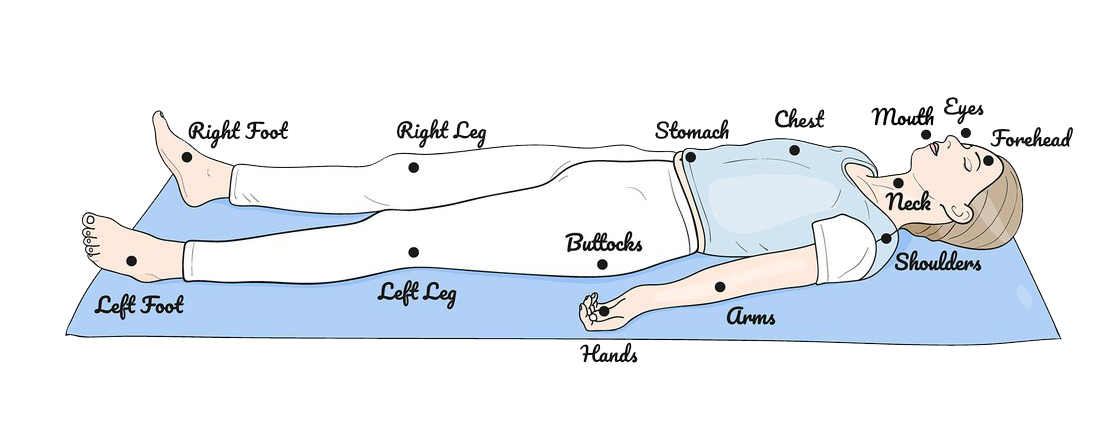Progressive Muscle Relaxation
Progressive Muscle Relaxation (PMR) works by helping to relax muscles that are held tightly so that we are able to relax the body. When the body feels relaxed, the mind is also able to relax because it is not getting signals from the body that there is something to be worried about. The way we hold our bodies can change the way we experience the world.
How do I do Progressive Muscle Relaxation?
Start by practicing your breathing technique to get into a comfortable and calming breathing rhythm. Make your out-breath longer than your in-breath.
When you feel ready, start at your toes. Clench your toes tightly as you breathe in. Keep the clenched as you breathe out. Breathe in again, and as you breathe out, relax your toes as you exhale.
Move up to your ankles and hold them as tightly as you can as you breathe in, and out, and in… and on the out-breath, relax your ankles.
Continue this practice as you move up your body, clenching or tensing and the relaxing your body parts one at a time.
Tense and then relax your calves, your knees, your thighs, your bottom.
Hold your tummy in tightly for a breath-cycle
Move to your fingers, then your fists, your wrists, your arm muscles, your shoulders, your back, your neck.
Clench and then relax your jaw, your cheeks, your nose, your eyes, your eyebrows.
Try tensing your whole body and relaxing.
Take a few more breath-cycles, and when you feel ready, you can engage in the world, again.
When you feel ready, start at your toes. Clench your toes tightly as you breathe in. Keep the clenched as you breathe out. Breathe in again, and as you breathe out, relax your toes as you exhale.
Move up to your ankles and hold them as tightly as you can as you breathe in, and out, and in… and on the out-breath, relax your ankles.
Continue this practice as you move up your body, clenching or tensing and the relaxing your body parts one at a time.
Tense and then relax your calves, your knees, your thighs, your bottom.
Hold your tummy in tightly for a breath-cycle
Move to your fingers, then your fists, your wrists, your arm muscles, your shoulders, your back, your neck.
Clench and then relax your jaw, your cheeks, your nose, your eyes, your eyebrows.
Try tensing your whole body and relaxing.
Take a few more breath-cycles, and when you feel ready, you can engage in the world, again.
How will this help me?
When we feel overwhelmed we are moving into a sympathetic nervous system response. When we are experiencing a stressful environmental situation, our body reacts by holding itself ready to react to anything that may come it’s way. This means that our brain perceives that there is some kind of danger happening because our body is telling it that there is ‘something wrong’ and becomes hyper-sensitive to anything that may signal danger.
We might hold our muscles tightly ready to run at a moment’s notice. We might be constantly aware of what is going on around us, and ready to react on a hair-trigger if we see anything that could be perceived as a threat. We might be constantly straining to hear noises that would signify danger. Our breathing might be quite fast and shallow, oxygenating our blood and giving us the ability to run really fast in a short burst to escape a threat.
Being alert to danger is good in the short term when we do have to react to dangerous situations. However, when this chronic alert levels go on for too long, it can be exhausting mentally and physically. We become desensitized to real dangers because ‘everything is dangerous’ and we become overly sensitized to any stimulation that could signal danger.
Our response developed in the early part of our brain development and is a reactive process that we cannot control. We can help our body to turn off this sympathetic response and remember what it feels like to be relaxed again by practicing Progressive Muscle relaxation.
We might hold our muscles tightly ready to run at a moment’s notice. We might be constantly aware of what is going on around us, and ready to react on a hair-trigger if we see anything that could be perceived as a threat. We might be constantly straining to hear noises that would signify danger. Our breathing might be quite fast and shallow, oxygenating our blood and giving us the ability to run really fast in a short burst to escape a threat.
Being alert to danger is good in the short term when we do have to react to dangerous situations. However, when this chronic alert levels go on for too long, it can be exhausting mentally and physically. We become desensitized to real dangers because ‘everything is dangerous’ and we become overly sensitized to any stimulation that could signal danger.
Our response developed in the early part of our brain development and is a reactive process that we cannot control. We can help our body to turn off this sympathetic response and remember what it feels like to be relaxed again by practicing Progressive Muscle relaxation.

